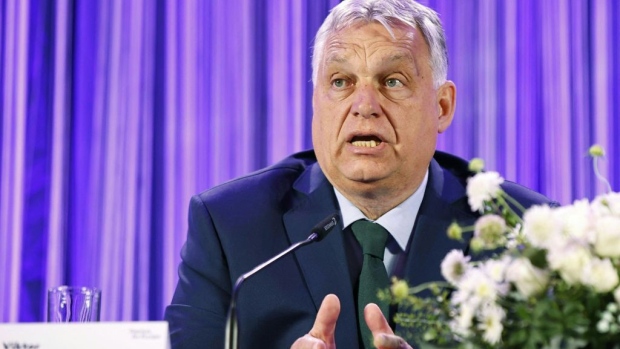Jun 30, 2024
Hungary’s Orban Forms Alliance With Austrian, Czech Nationalists
, Bloomberg News

(Bloomberg) -- Hungarian Prime Minister Viktor Orban announced the formation of a political group with nationalist forces in Austria and the Czech Republic, seeking to break out of his isolation within the European Union and lure right-wing groups looking to build on rising support from voters.
The alliance is the latest twist in a tumultuous period for Europe’s populist right, following advances in continent-wide elections earlier this month and as recent polls projected a surge at French legislative elections Sunday.
They’re now assessing how to leverage their support and upend the dominance of moderate parties, while also dealing with more divisive groups on the far-right such as Germany’s AfD.
Italian Prime Minister Giorgia Meloni, in particular, has been looking to exert more influence, and frustrated by closed-door negotiations between the center-right European People’s Party (EPP), the socialists and the liberals to nominate European Commission President Ursula von der Leyen to a second term.
It’s uncertain whether von der Leyen’s appointment has enough backing to be approved by European lawmakers next month.
Separate Caucus
For Orban’s Fidesz, the move is an attempt to return to a more influential position in the bloc since having to leave the moderate conservative EPP in 2021. Austria’s Freedom Party has been a member of the Identity and Democracy group spearheaded by France’s Rassemblement National, while former Czech Prime Minister Andrej Babis’s ANO is leaving the liberal Renew caucus to join Orban’s new grouping.
“We are creating a political formation that will forge ahead and soon become Europe’s largest right-wing group,” Orban told reporters in Vienna on Sunday.
One hurdle to expanding Orban’s group, including efforts to lure Poland’s Law & Justice, may be differing attitudes to Russia.
The Hungarian leader and the Freedom Party have been staunch opponents of providing military and financial aid to Ukraine. Law & Justice, as well as Meloni, have pledged to support Ukraine.
Orban’s previous overtures to the European Conservatives and Reformists group that includes Meloni didn’t lead to an alliance.
The three parties joining forces Sunday will initially have the minimum of 23 seats needed to formally create a separate caucus within the European Parliament. But they’ll also need to include deputies from at least seven member states to be recognized.
Matteo Salvini, Italy’s junior coalition party leader, said he welcomed the plans, without formally declaring whether his League party would join Orban’s alliance.
“We want to expand as much as possible the perimeters of a group that will be strong, patriotic, united and opposed to under-the-table agreements,” Salvini said on Sunday.
The new political group vowed to curtail the European Union’s influence and give more power back to member states, as well as fighting immigration.
The leaders said in Vienna they would continue negotiations on forming the alliance and hold another briefing later in Brussels, where Hungary is scheduled to take over the EU’s rotating presidency on Monday.
--With assistance from Donato Paolo Mancini.
(Updates with Salvini comments from 12th paragraph, background throughout.)
©2024 Bloomberg L.P.







